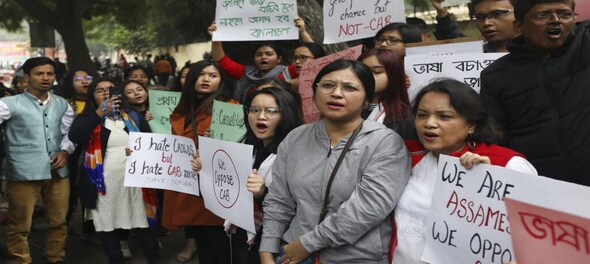
The assembly election results in Tripura, Nagaland and Meghalaya make it clear that the BJP has entrenched itself in the north-east both by cementing its position in states like Assam and Tripura and entering into alliances with regional parties in states like Nagaland.
The party has retained Tripura, though with a dip in its tally. It won 32 out of 60 seats in the state, losing some seats compared to the last time because of the rise of Tipra Motha, a tribal party set up by former Congress leader Pradyot Bikram Manikya Debbarma, which won 13 seats.
r
In Nagaland, deft alliance-building has helped the BJP ensure that it is part of the ruling alliance. Chief Minister Neiphiu Rio’s National Democratic Progressive Party (NDPP) won a clear victory in alliance with the BJP. In the 60-member assembly, the NDPP won 25 seats and the BJP won 12.
Also Read: Nagaland Election Results 2023 Highlights: BJP-led alliance secures majority in official EC results
Meghalaya delivered a fractured verdict, as Chief Minister Conrad Sangma’s National People’s Party, though the largest party by a distance, won 26 seats, falling short of the majority mark by four seats. The BJP, which won two seats, has already pledged support to NPP after Conrad Sangma spoke to Amit Shah. Sangma still requires two more MLAs to form a government in the 60-member assembly where there were elections only for 59 seats because of the death of a candidate.
In Meghalaya, the Congress has suffered heavy losses compared to the last time, when it won 21 seats in the 60-seat assembly. The Congress has lost 16 seats and ended up with just five seats. The reason: it could not retain its leader Mukul Sangma, who quit the party in 2021 to join the All-India Trinamool Congress. His joining AITC has led to immediate gains to Mamata Banerjee’s party, which has equalled the tally of the Congress with five seats.
Seen from a national perspective – even if the region that is crucial from the national security standpoint does not send a significant number of MPs to the Lok Sabha – the BJP has now acquired a clear and sustainable foothold in the north-eastern region. It has twice won Assam and Tripura on its own, and has also been able to strike alliances that have enabled it to share power, like the one with NDPP in Nagaland. Last year, the BJP secured a majority in the Manipur assembly elections, winning 32 out of the 60 assembly seats and restricting the Congress to just five.
From the point of view of the Congress, the present election results in three north-eastern states make it clear that the grand old party’s woes are far from over. To use cricket parlance, it is electorally out of form for quite some time now and is unable to attract the electorate.
That the party’s dismal electoral run is also a result of its inability to achieve organisational coherence is also made clear by the fact that many electoral success stories of even this election revolve around leaders who were in the Congress but deserted it.
In Tripura, former Congress leader Pradyot Manikya Debbarma, the head of the erstwhile ruling family of Tripura, has taken off to a flying start with Tipra Motha. In Meghalaya, the Congress could not retain Mukul Sangma, leading to gains for AITC. Further, BJP-ally NDPP, which is the single largest party in the assembly, is headed by Conrad Sangma, whose father PA Sangma was a Congress leader and whose sister Agatha Sangma was also a minister in the first Manmohan Singh government.
Even in Nagaland, Chief Minister Neiphiu Rio, who is set to become CM for another term in alliance with the BJP, was a Congress leader till about two decades ago. The BJP’s chief north-east strategist and Assam Chief Minister Himanta Biswa Sarma was himself in the Congress till some years ago, but had quit the party to join the BJP, accusing the Congress leadership of not taking his grievances seriously. The BJP's Tripura leader Manik Saha is also a former Congressman.
The results are also a disappointment for the left, as it has been drubbed by the BJP for a second consecutive time in Tripura. Till 2018, Tripura was as much a CPI (M) bastion as Kerala is now or Bengal was till slightly more than a decade ago. However, despite an alliance with the Congress in Tripura this time, the CPI (M) could not defeat the BJP, suggesting that the state has slipped away from it just like Bengal had.
The results show that the BJP remains an electoral machine, attracting new voters and also striking alliances where it is weak. The Congress, by contrast, has lost its electoral heft.
The entry of the AITC in Meghalaya also shows that despite statements regarding the need for opposition unity by Congress president Mallikarjuna Kharge – something that was endorsed even by Tamil Nadu Chief Minister MK Stalin – regional parties, be it AITC or Aam Admi Party, are looking to replace the Congress where possible.
In short, north-eastern elections 2023 suggest that the electoral primacy of the BJP over its arch-rival, the Congress, is continuing.
—The author, Vikas Pathak is a columnist who teaches at Asian College of Journalism, Chennai. The views expressed are personal.
Read his previous articles here
(Edited by : C H Unnikrishnan)
Check out our in-depth Market Coverage, Business News & get real-time Stock Market Updates on CNBC-TV18. Also, Watch our channels CNBC-TV18, CNBC Awaaz and CNBC Bajar Live on-the-go!


In Andhra Pradesh's silk hub, weavers' cry for help echoes through election season
May 3, 2024 12:24 PM
Feroze Gandhi to Rahul Gandhi: Rae Bareli's tryst with Congress
May 3, 2024 11:36 AM
Rahul Gandhi to contest from Raebareli, close aide KL Sharma from Amethi
May 3, 2024 8:39 AM
BJP's Hindi heartland dominance faces test in phase 3 polls
May 2, 2024 9:14 PM

